BusinessEurope Headlines No. 2016-20
President Marcegaglia addresses European Business Summit
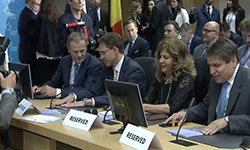 Speaking in the opening session of the European Business Summit attended by European Council President Donald Tusk and European Commission Vice-President Jyrki Katainen on 1 June, the President of BusinessEurope, Emma Marcegaglia explained what companies expected from the European Council and the European Commission. "The modest economic recovery in the European Union should continue. However, several risks exist: reform fatigue in some European countries, the slowdown of China, the potential for renewed financial market instability, the upcoming UK referendum, as well as the migration crisis and the strain it is placing on the Schengen agreement. We urgently need a coherent global EU strategy, with a stronger economic pillar as well as real implementation of pro-competitiveness policies to boost investment, growth and employment in Europe. And we need to safeguard Schengen", Emma Marcegaglia said. At the time of publication EBS is still under way. We will publish a full report on the summit in the next edition of Headlines and a short news item on the closing plenary session later today on www.businesseurope.eu.
Speaking in the opening session of the European Business Summit attended by European Council President Donald Tusk and European Commission Vice-President Jyrki Katainen on 1 June, the President of BusinessEurope, Emma Marcegaglia explained what companies expected from the European Council and the European Commission. "The modest economic recovery in the European Union should continue. However, several risks exist: reform fatigue in some European countries, the slowdown of China, the potential for renewed financial market instability, the upcoming UK referendum, as well as the migration crisis and the strain it is placing on the Schengen agreement. We urgently need a coherent global EU strategy, with a stronger economic pillar as well as real implementation of pro-competitiveness policies to boost investment, growth and employment in Europe. And we need to safeguard Schengen", Emma Marcegaglia said. At the time of publication EBS is still under way. We will publish a full report on the summit in the next edition of Headlines and a short news item on the closing plenary session later today on www.businesseurope.eu.
Read more, watch the video or contact: Thérèse de Liedekerke
Innovation should be systematically streamlined into policy and regulatory measures
 "We believe politicians must now scale up to frame an environment conducive to innovation, in order to streamline innovation systematically into policy and regulatory measures". This was the main message delivered on 31 May by BusinessEurope Director General Markus J. Beyrer at the high-level seminar "Europe as a pro-innovation environment" in Brussels. The event was organised by Robert Madelin, Senior Adviser for Innovation to Commission President Juncker, in cooperation with the Dutch EU Presidency. Following the conclusions recently adopted by the Competitiveness Council on friendly environment for research and innovation, stakeholders were invited to discuss proposed actions to set framework conditions favourable to innovation. "To incorporate the Innovation Principle in the policy-making system shall help", Markus J. Beyrer said. It is key to assess the impact of regulation on innovation, he added, as well-designed legislation can stimulate innovation, while poorly drafted legislation can also stifle it.
"We believe politicians must now scale up to frame an environment conducive to innovation, in order to streamline innovation systematically into policy and regulatory measures". This was the main message delivered on 31 May by BusinessEurope Director General Markus J. Beyrer at the high-level seminar "Europe as a pro-innovation environment" in Brussels. The event was organised by Robert Madelin, Senior Adviser for Innovation to Commission President Juncker, in cooperation with the Dutch EU Presidency. Following the conclusions recently adopted by the Competitiveness Council on friendly environment for research and innovation, stakeholders were invited to discuss proposed actions to set framework conditions favourable to innovation. "To incorporate the Innovation Principle in the policy-making system shall help", Markus J. Beyrer said. It is key to assess the impact of regulation on innovation, he added, as well-designed legislation can stimulate innovation, while poorly drafted legislation can also stifle it.
Contact: Valentina Spina
Meeting Commissioner Lord Hill
 BusinessEurope shares the European Commission’s objective to create a Capital Markets Union to give companies better access to capital markets, Director General Markus J. Beyrer told Lord Hill, Commissioner for Financial Stability, Financial Services and Capital Markets Union, on 31 May. The Commission should stay active and vigilant in devising and implementing new financial legislation to make financial markets more robust whilst ensuring that they can provide the necessary finance to the real economy to create growth and jobs. BusinessEurope also shares the Commission’s objective to fight tax fraud and evasion as it creates strong competitive distortions at the vast expense of companies who pay their taxes in full but proposals to implement public country-by-country reporting are disproportionate and risk damaging competitiveness.
BusinessEurope shares the European Commission’s objective to create a Capital Markets Union to give companies better access to capital markets, Director General Markus J. Beyrer told Lord Hill, Commissioner for Financial Stability, Financial Services and Capital Markets Union, on 31 May. The Commission should stay active and vigilant in devising and implementing new financial legislation to make financial markets more robust whilst ensuring that they can provide the necessary finance to the real economy to create growth and jobs. BusinessEurope also shares the Commission’s objective to fight tax fraud and evasion as it creates strong competitive distortions at the vast expense of companies who pay their taxes in full but proposals to implement public country-by-country reporting are disproportionate and risk damaging competitiveness.
Read more or contact: Erik Berggren
Trade is under fire when it aims at delivering more
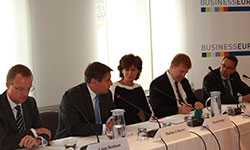 "Trade is no longer limited to elimination of tariffs. This is what allows it to increasingly have the objective of promoting fair market conditions that respect and promote high standards", Markus J. Beyrer, Director General of BusinessEurope, said on 31 May at the event entitled "Trade under Fire : a Transatlantic Dialogue on Challenges and Opportunities" at BusinessEurope. Panellists at the event - moderated by AmCham EU Managing Director Susan Danger - were Myron Brilliant, US Chamber of Commerce Executive Vice-President and Head of International Affairs, Liam Benham, IBM Europe Vice President Government and Regulatory Affairs, Wolfgang Weber, BASF Vice President EU Government Relations. Business communities in the EU and the USA work together to promote a better trade environment: one that recognises the rule of law and our values and interests vis-à-vis common challenges like fragmented global value chains, overcapacity and new forms of protectionism.
"Trade is no longer limited to elimination of tariffs. This is what allows it to increasingly have the objective of promoting fair market conditions that respect and promote high standards", Markus J. Beyrer, Director General of BusinessEurope, said on 31 May at the event entitled "Trade under Fire : a Transatlantic Dialogue on Challenges and Opportunities" at BusinessEurope. Panellists at the event - moderated by AmCham EU Managing Director Susan Danger - were Myron Brilliant, US Chamber of Commerce Executive Vice-President and Head of International Affairs, Liam Benham, IBM Europe Vice President Government and Regulatory Affairs, Wolfgang Weber, BASF Vice President EU Government Relations. Business communities in the EU and the USA work together to promote a better trade environment: one that recognises the rule of law and our values and interests vis-à-vis common challenges like fragmented global value chains, overcapacity and new forms of protectionism.
Contact: Eleonora Catella
TTIP dialogue with social partners
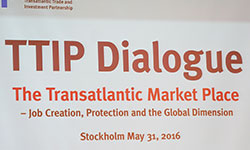 Swedish Enterprise (the Swedish business confederation) and the Swedish trade unions LO organised an event in Stockholm on 31 May to encourage an open exchange of views between business, trade unions and consumers on several aspects of the Transatlantic Trade and Investment Partnership. The participants from the EU and the USA discussed what TTIP can bring to businesses, workers and consumers, how it can be used to promote common values and standards, influence global rules and enhance inclusive growth. European Commissioner Cecilia Malmström and USTR Froman were present: it was a good opportunity to reaffirm the importance of having an ambitious agreement that can deliver positive results for a wider number of stakeholders. BusinessEurope chaired the session dealing with trade and goods and services and the impact on jobs.
Swedish Enterprise (the Swedish business confederation) and the Swedish trade unions LO organised an event in Stockholm on 31 May to encourage an open exchange of views between business, trade unions and consumers on several aspects of the Transatlantic Trade and Investment Partnership. The participants from the EU and the USA discussed what TTIP can bring to businesses, workers and consumers, how it can be used to promote common values and standards, influence global rules and enhance inclusive growth. European Commissioner Cecilia Malmström and USTR Froman were present: it was a good opportunity to reaffirm the importance of having an ambitious agreement that can deliver positive results for a wider number of stakeholders. BusinessEurope chaired the session dealing with trade and goods and services and the impact on jobs.
Contact: Luisa Santos
Towards a shared vision of apprenticeships
 Achieving well-functioning apprenticeship schemes that are both cost-effective for enterprises and reflecting their skills needs are the priority issues that need to be addressed to tap the business case for apprenticeships. This was one of the key messages by Maxime Cerutti, Director of Social Affairs, during a conference of the European social partners on 26-27 May. The conference discussed the outcomes of recent separate projects by the European employers on the cost-effectiveness of apprenticeship schemes and by the ETUC on a proposal for a European quality framework for apprenticeships. BusinessEurope stands ready for further discussions with the European Commission, member states and trade unions on the future of apprenticeships.
Achieving well-functioning apprenticeship schemes that are both cost-effective for enterprises and reflecting their skills needs are the priority issues that need to be addressed to tap the business case for apprenticeships. This was one of the key messages by Maxime Cerutti, Director of Social Affairs, during a conference of the European social partners on 26-27 May. The conference discussed the outcomes of recent separate projects by the European employers on the cost-effectiveness of apprenticeship schemes and by the ETUC on a proposal for a European quality framework for apprenticeships. BusinessEurope stands ready for further discussions with the European Commission, member states and trade unions on the future of apprenticeships.
Read more, watch the video or contact: Maxime Cerutti
Spring Economic Outlook: political uncertainty dampening Europe’s economic recovery
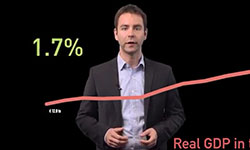 We can expect a continuation of the moderate economic recovery across the EU, according to BusinessEurope’s latest economic forecast. Overall, we expect growth of 2.0% in the EU in 2016 and 1.9% in 2017. For the Euro-area, we expect growth of 1.7% in both 2016 and 2017. Our report, released on 1 June 2016, however also stresses that a number of global and domestic factors are leading to substantial uncertainty and in many cases firms postponing investment decisions. A special feature looks at the Schengen agreement and finds that a fragmentation would undermine confidence, significantly reduce EU growth, and put the ongoing recovery at risk.
We can expect a continuation of the moderate economic recovery across the EU, according to BusinessEurope’s latest economic forecast. Overall, we expect growth of 2.0% in the EU in 2016 and 1.9% in 2017. For the Euro-area, we expect growth of 1.7% in both 2016 and 2017. Our report, released on 1 June 2016, however also stresses that a number of global and domestic factors are leading to substantial uncertainty and in many cases firms postponing investment decisions. A special feature looks at the Schengen agreement and finds that a fragmentation would undermine confidence, significantly reduce EU growth, and put the ongoing recovery at risk.
Read more, watch the summary video or contact: Frederik Lange
B20 Coalition meets in Paris
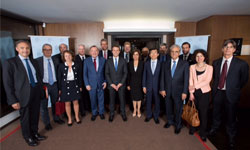 The B20 Coalition, that includes major business organisations of G20 countries, gathered in Paris on 1 June to elect a new president: Ulrich Grillo of the German Business Confederation BDI. The meeting was also an opportunity to discuss the political and economic challenges that are influencing business in Europe, the Americas, Asia or Australia. The Coalition also agreed to work on topics that are of common interest to the business community around the world like trade or digital economy. However the main focus of the Coalition in the months ahead will be resource efficiency and the circular economy. Among possible deliverables: a platform to exchange best practices in this area.
The B20 Coalition, that includes major business organisations of G20 countries, gathered in Paris on 1 June to elect a new president: Ulrich Grillo of the German Business Confederation BDI. The meeting was also an opportunity to discuss the political and economic challenges that are influencing business in Europe, the Americas, Asia or Australia. The Coalition also agreed to work on topics that are of common interest to the business community around the world like trade or digital economy. However the main focus of the Coalition in the months ahead will be resource efficiency and the circular economy. Among possible deliverables: a platform to exchange best practices in this area.
Contact: Luisa Santos
Replying to public consultation on the transparency register
 BusinessEurope and its members fully support transparency; they are on the register since its early days and have welcomed its overall political objectives. We have answered the European Commission consultation, making concrete proposals for further improving transparency without increasing administrative burdens linked to registering or discouraging contacts between small and medium-sized enterprises and the European Commission or Parliament. This concerns in particular the delivery of figures (problem of ‘compliance’), the issue of double (or even triple) counting, membership costs, and generally making the system as easy and user-friendly as possible.
BusinessEurope and its members fully support transparency; they are on the register since its early days and have welcomed its overall political objectives. We have answered the European Commission consultation, making concrete proposals for further improving transparency without increasing administrative burdens linked to registering or discouraging contacts between small and medium-sized enterprises and the European Commission or Parliament. This concerns in particular the delivery of figures (problem of ‘compliance’), the issue of double (or even triple) counting, membership costs, and generally making the system as easy and user-friendly as possible.
Read more or contact: Christian Feustel
Transfer of SMEs: public policies improve in some member states, but a new European initiative is needed
 "When looking at the 1994 and 2006 European Commission recommendations for facilitating the transfer of businesses, the glass is half full", Marta Marti, Chair of BusinessEurope’s Entrepreneurship & SME Committee, said at the summit organised by Transeo, the European SME Transfer Association. The summit discussed SME transfer in Cologne on 24-25 May. On paper, most member states have initiated policies to facilitate transfer, but in one third of the member states having taken action, the degree of availability of measures is low or moderate. A new impulse should be given by the Commission to energise national policies. Best practices should be disseminated in the areas of awareness-raising - raising the awareness of entrepreneurs about the need to plan at an early stage for the transfer of their business - and of multidisciplinary business support services.
"When looking at the 1994 and 2006 European Commission recommendations for facilitating the transfer of businesses, the glass is half full", Marta Marti, Chair of BusinessEurope’s Entrepreneurship & SME Committee, said at the summit organised by Transeo, the European SME Transfer Association. The summit discussed SME transfer in Cologne on 24-25 May. On paper, most member states have initiated policies to facilitate transfer, but in one third of the member states having taken action, the degree of availability of measures is low or moderate. A new impulse should be given by the Commission to energise national policies. Best practices should be disseminated in the areas of awareness-raising - raising the awareness of entrepreneurs about the need to plan at an early stage for the transfer of their business - and of multidisciplinary business support services.
Read more or contact: Daniel Cloquet
The "quick-assessment procedure": a mechanism to better apply mutual recognition
 The principle of mutual recognition was the basis of the single market. It enables national rules to coexist between member states without restricting the free movement of goods. For business, this means opening up markets for products to be placed on without the need to fulfil additional criteria. Yet the principle has eroded overtime as national rules are prioritised over free movement. This was explained by Patrick Grant at an EPC single market roundtable on mutual recognition on 1 June. BusinessEurope believes that an ambitious mechanism, the "quick-assessment procedure", is needed to raise transparency in this area to ensure mutual recognition is applied correctly in practice.
The principle of mutual recognition was the basis of the single market. It enables national rules to coexist between member states without restricting the free movement of goods. For business, this means opening up markets for products to be placed on without the need to fulfil additional criteria. Yet the principle has eroded overtime as national rules are prioritised over free movement. This was explained by Patrick Grant at an EPC single market roundtable on mutual recognition on 1 June. BusinessEurope believes that an ambitious mechanism, the "quick-assessment procedure", is needed to raise transparency in this area to ensure mutual recognition is applied correctly in practice.
Read more or contact: Patrick Grant
Achieving greater accessibility in society by accommodating a compatible approach
 In December 2015, the European Commission proposed the European Accessibility Act to improve the functioning of the single market for accessible products and services to include a greater amount of people with disabilities in society. BusinessEurope recently published its position paper on the subject. While we understand the Commission’s objectives, we do not believe the approach being taken will achieve them. Applying blanket requirements to all ranges of products or services will greatly dilute their worthiness to the people businesses are trying to reach with various distinct needs. Innovation will also be hampered in a sector that relies on it. National interpretation of the vague provisions included could also create new single market barriers in practice. Permitting compatible conformity would achieve a more focused approach for people with disabilities.
In December 2015, the European Commission proposed the European Accessibility Act to improve the functioning of the single market for accessible products and services to include a greater amount of people with disabilities in society. BusinessEurope recently published its position paper on the subject. While we understand the Commission’s objectives, we do not believe the approach being taken will achieve them. Applying blanket requirements to all ranges of products or services will greatly dilute their worthiness to the people businesses are trying to reach with various distinct needs. Innovation will also be hampered in a sector that relies on it. National interpretation of the vague provisions included could also create new single market barriers in practice. Permitting compatible conformity would achieve a more focused approach for people with disabilities.
Read more or contact: Patrick Grant
Calendar
 6-9 June 2016: European Parliament plenary sitting, Strasbourg
6-9 June 2016: European Parliament plenary sitting, Strasbourg- 7 June 2016: legal migration package
- 7 June 2016: new 'skills agenda for Europe'
- 7 June 2016: European Commission contribution to the Global Strategy
- 9 June 2016: Brussels Economic Forum, Brussels